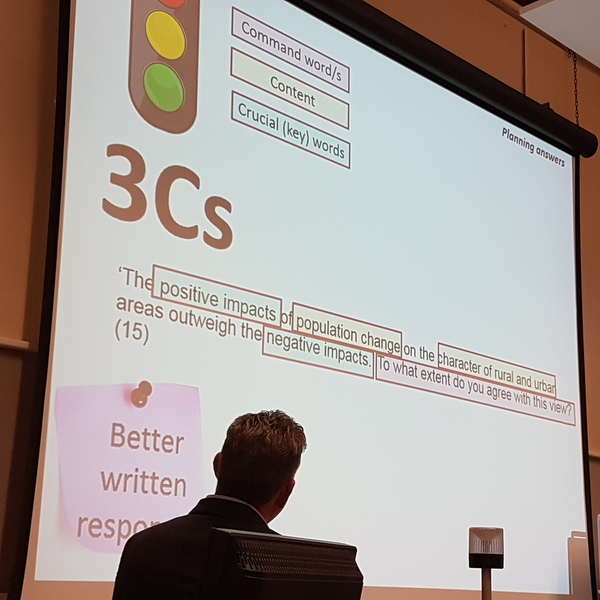Reflections on GA Geography revision event by Amy Case, UWE PGCE student
Reflections on GA Bristol Branch Post-16 revision event: Practical strategies for succeeding in geography exams.
Amy Case, UWE PGCE Geography student
Having just returned from this year’s Annual GA conference, where I attended a teacher-to-teacher session on how schools might contact and collaborate with universities, it was fantastic to see that Bristol schools and universities are already leading the way. On Tuesday 11th April 2018, the Bristol Branch of the GA held a revision event at the University of Bristol, which saw A-level students and teachers from Cabot Learning Federation, Redmaids’ High School, Frome College, Bristol Grammar School and Clifton College come together with PGCE students and their tutor from the University of the West of England, to develop practical strategies for succeeding in geography exams.
The event opened with a student-led discussion regarding an image of a shoreline with the words, ‘Writing the Earth’ written in the sand. This starter activity is a subtle yet impactful way of bringing geography’s rich historical legacy to the forefront. Students were able to interpret it, with some students being able to directly relate it to the ancient Greek meaning of geography itself. For the students I worked with, the image led to them asking geographical questions such as “is the wave coming in or out?” and “which beach is it?” What I found most interesting is that the students were correct in their deductions yet were not particularly confident in sharing them at first. The activity opened their eyes to what they already knew but were not aware of. We know that it is unlikely for every student to complete all questions correctly in an exam. However, students lose marks every year for failing to even guess on a multiple-choice or for a one-mark question and although I am not advocating guessing, I think this activity did give students confidence to ‘give it a go’.

The first part of the evening was themed around ‘Better Written Responses’ which included a breakdown of assessment objectives, short responses, long responses and analysing data. The activities required students to ‘Take Command’, organising command words whilst being able to justify their decisions. This was particularly useful, considering the multiplicity of specifications being covered in the room as all students recognised the majority of command words which will appear in exams. We discussed analysing questions and how students might plan for a question before answering. For some, planning in an exam was a new concept and students were able to work together with the PGCE students to share tips and techniques for doing this effectively. There was free flow of conversations between groups regarding their MOCS and how they could see the benefit in what they had learnt.

In the second half of the evening students had opportunities to practically assess some strategies that they could ‘take home with them’ to inform their revision planning. Various activities were carried out which illustrated different approaches to revision such as using personal analogies such as a football team line up to organise knowledge around topics. Another idea explored were key word hexagons whereby only linked information could touch another side of a hexagon (based on the SOLO taxonomy). Student responses mainly boiled down to them being relieved of now having alternative approaches to revising, other than the traditional methods of highlighting key words in textbooks and creating revision cards, although we know for some this absolutely works.
Overall, the evening was a success and it was a pleasure to meet dedicated geography students and their teachers. As a teacher starting my NQT post in September 2018 it was an invaluable opportunity to gain some student voice around A-level revision to understand how I might better support my own A-level students in the future. The turnout of support from Geography academics, teachers and students from the Bristol Geography community also shows that multiple minds are better than one and that collaboration can only be a good thing.
